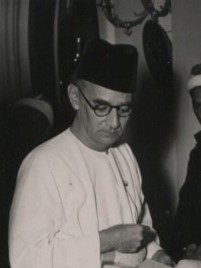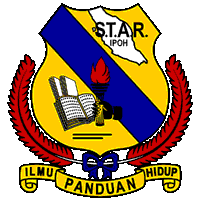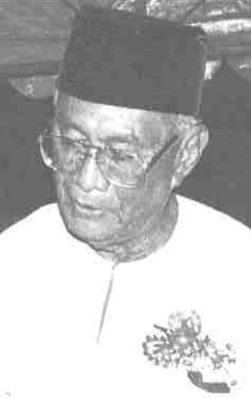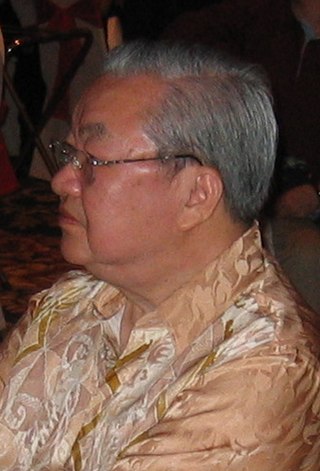
Tun Haji Abdul Razak bin Dato' Hussein was a Malaysian lawyer and politician who served as the 2nd Prime Minister of Malaysia from September 1970 until his death in January 1976. He also served as the first deputy prime minister of Malaysia from August 1957 to September 1970. He is referred to as the Father of Development.

Tunku Abdul Rahman Putra Al-Haj ibni Almarhum Sultan Abdul Hamid Halim Shah was a Malaysian statesman and lawyer who served as the 1st Prime Minister of Malaysia and the head of government of its predecessor states from 1955 to 1970. He was the first chief minister of the Federation of Malaya from 1955 to 1957. He supervised the independence process that culminated on 31 August 1957. As Malaya's first prime minister he dominated politics there for the next 13 years. In 1963, he successfully incorporated the Federation of Malaya, British North Borneo, Sarawak, and Singapore into the state of Malaysia. However, tensions between the Malay and Chinese communities resulted in Singapore's expulsion in 1965. His poor performance during race riots in Kuala Lumpur in 1969 led to his resignation in 1970. Commonly known simply as "Tunku", Tunku Abdul Rahman is widely regarded, even by his critics, as Malaysia's "founding father", the architect of Malayan independence and of the formation of Malaysia. As such, he is often referred to as Father of Independence or Father of Malaysia.

Tun Hussein bin Dato' Onn was a Malaysian lawyer and politician who served as the 3rd Prime Minister of Malaysia from the death of his predecessor Abdul Razak Hussein in January 1976 to his retirement in July 1981. Moreover, he was the Member of Parliament (MP) for Sri Gading from 1974 to 1981, representing Barisan Nasional (BN) and United Malays National Organisation (UMNO). He was granted the soubriquet Father of Unity.

Dato' Sir Onn bin Dato' Jaafar was a Malayan politician who served as the 7th Menteri Besar of Johor from 1947 to 1950, then Malaya. His organized opposition towards the creation of the Malayan Union led him to form the United Malays National Organisation (UMNO) in 1946; he was UMNO's founder and its first President until his resignation in 1951. He was famously known as the pioneer of organised anti-imperialism and early Malay nationalism within the entire Malaya, which eventually culminated with the Malayan independence from Britain. He was also responsible for the social and economic welfare of the Malays by setting up the Rural Industrial Development Authority (RIDA).

Sekolah Dato' Abdul Razak is a premiere, Sekolah Berasrama Penuh for boys in Seremban, Negeri Sembilan, Malaysia. It is one of the most prestigious schools, selecting the best students in the country and is named after Abdul Razak Hussein.

Sekolah Tuanku Abdul Rahman is a premier, all-boys fully residential school in Malaysia funded by the Government of Malaysia. Named after the first Yang di-Pertuan Agong (King) of the Federation of Malaya, Almarhum Seri Paduka Baginda Tuanku Abdul Rahman ibni Almarhum Tuanku Muhammad, it is located in Ipoh, Perak. The school started at an army camp in Baeza Avenue. Formerly known as Malay Secondary School, the school was built by the Malayan government in 1957. In 2011,the school was awarded with the Sekolah Berprestasi Tinggi or High Performance School title, a title awarded to schools in Malaysia that have met stringent criteria including academic achievement, strength of alumni, international recognition, network and linkages.

Tun Dr. Ismail bin Abdul Rahman was a Malaysian politician who served as the second Deputy Prime Minister of Malaysia from September 1970 to his death in August 1973. A member of the United Malays National Organisation (UMNO), he previously held several ministerial posts.
Mohamed Noah bin Omar was a Malaysian politician. He was one of the leading figures who founded the United Malays National Organisation (UMNO) and became the first Speaker of the Dewan Rakyat.
High School Batu Pahat (HSBP) is a secondary school for boys located in the town of Batu Pahat in the state of Johor, Malaysia. It was known as Government English School previously, but was changed to High School Batu Pahat after the independence of Malaysia.
This article lists important figures and events in Malayan public affairs during the year 1962, together with births and deaths of significant Malayans.

Mohamed Khaled bin Nordin is a Malaysian politician who has served as the Minister of Higher Education for the second term in Pakatan Harapan (PH) administration under Prime Minister Anwar Ibrahim since December 2022 and the Member of Parliament (MP) for Kota Tinggi since November 2022. He served as the 15th Menteri Besar of Johor from May 2013 to May 2018, Deputy Minister of Works, Minister of Entrepreneur and Co-operatives Development and his first term as Minister of Higher Education in the Barisan Nasional (BN) administration under former Prime Ministers Mahathir Mohamad, Abdullah Ahmad Badawi and Najib Razak from 1999 to 2013, MP for Johor Bahru from October 1990 to March 2004 and for Pasir Gudang from March 2004 to May 2013, Member of the Johor State Legislative Assembly (MLA) for Permas from May 2013 to May 2018 and Chairman of Boustead Holdings from 2020 to his resignation in 2021. He is a member of the United Malays National Organisation (UMNO), a component party of the ruling Barisan Nasional (BN) coalition. He has served as the Vice President of UMNO since June 2018 and State Chairman of UMNO of Johor since January 2023.
1957: Hati Malaya is a 2007 Malaysian Malay-language historical drama film. It was released on 25 October 2007.

Tun Dr. Awang bin Hassan was a Malaysian politician who served as the 5th Yang di-Pertua Negeri (Governor) of Penang from 1981 until his retirement in 1989. He had previously served as the 7th Malaysian High Commissioner to Australia from 1973 to 1980.

The Mahmoodiah Royal Mausoleum is a Royal Mausoleum of Johor located at Bukit Mahmoodiah in Jalan Mahmoodiah, Johor Bahru, Malaysia. The first Sultan of Johor buried here was Sultan Abu Bakar in 1895. Besides that, the founder of UMNO, Dato' Onn Jaafar was buried next to his father, Dato Jaafar bin Muhammad's grave.
Tan Sri Dato’ Haji Anwar bin Haji Abdul Malik (1898–1998) was a Malaysian politician. Anwar along with, Dato' Onn Jaafar, Tan Sri Mohamed Noah Omar, Haji Syed Alwi bin Syed Sheikh al-Hadi and Dato' Syed Abdul Kadir Mohamed formed the United Malays National Organisation to counter the Malayan Union that was undermining the Malay Sultans's powers and threatened the Malays of their rights as Bumiputera.

Nik Ahmad Kamil bin Nik Mahmud was a Malaysian politician who played an active role during the country's road to independence. A prominent member of the United Malays National Organisation (UMNO) in the state of Kelantan, he served as the fourth Speaker of the Dewan Rakyat, the lower house of the Malaysian Parliament.

The English College Johore Bahru, also known as Maktab Sultan Abu Bakar, abbreviated as English College, EC, MSAB, The college, and sometimes dubbed "The Pride Of Johore", is an old premier school in Malaysia. It is an all-boys school in Johor Bahru, Johor. The school is under the royal patronage of the Sultanate of Johor, and it has been awarded the status of Cluster School of Excellence by the Ministry of Education (Malaysia). English College Johore Bahru (EC) is one of the ten oldest English institutions in Malaysia and the oldest school in Johore.

Lee San Choon is a former Malaysian politician and a businessman. He is the fourth president of Malaysian Chinese Association (MCA), a major component party of Barisan Nasional (BN) from 1975 to 1983. He led the party in three general election elections in Malaysia, most successfully in the 1982 general election. He held various ministerial posts in the cabinet of the Malaysian government from 1969 to 1983, such as Labour and Manpower Minister, Works and Public Utilities Minister, as well as Transport Minister
Tun Sulaiman bin Ninam Shah was a Malaysian businessman and veteran politician. He was also former member of Johore State Council for Muar Coastal (1954–1959) and Johor State Legislative Assembly for Parit Jawa (1959-1964), former Senator (1979-1985) and the 6th Deputy President of the Dewan Negara (1982-1985). He is one of the founders of United Malays National Organisation (UMNO) and former Permanent Chairman of UMNO (1976-2003).
 Malaya :
Malaya :  Commander of the Order of the Defender of the Realm (PMN) – Tan Sri (1958) [1]
Commander of the Order of the Defender of the Realm (PMN) – Tan Sri (1958) [1]  Johor :
Johor :  Companion of the Order of the Crown of Johor (SMJ) (1951) [4]
Companion of the Order of the Crown of Johor (SMJ) (1951) [4]  Knight Commander of the Order of the Crown of Johor (DPMJ) – Dato’ (1959) [5]
Knight Commander of the Order of the Crown of Johor (DPMJ) – Dato’ (1959) [5] 











